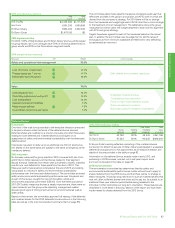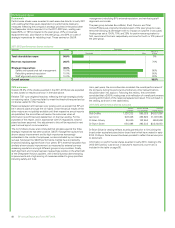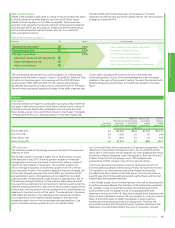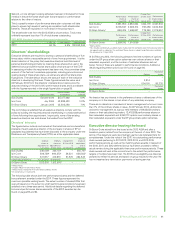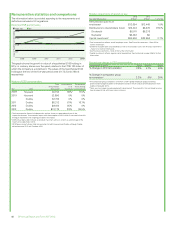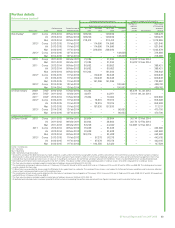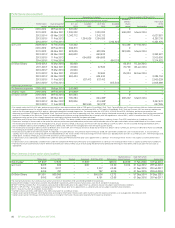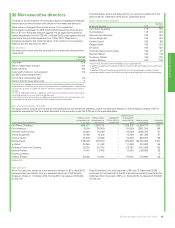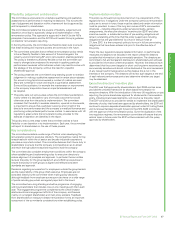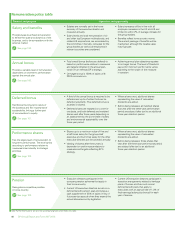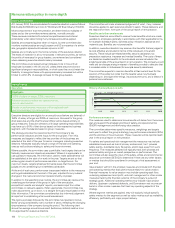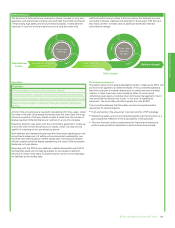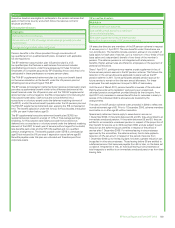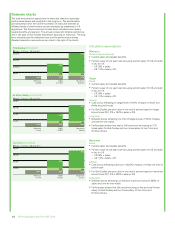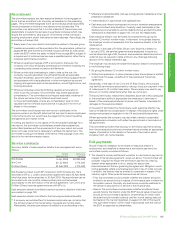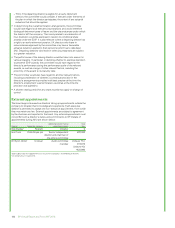BP 2013 Annual Report Download - page 101
Download and view the complete annual report
Please find page 101 of the 2013 BP annual report below. You can navigate through the pages in the report by either clicking on the pages listed below, or by using the keyword search tool below to find specific information within the annual report.
Corporate governance
BP Annual Report and Form 20-F 2013 97
Flexibility, judgement and discretion
The committee is empowered to undertake quantitative and qualitative
assessments of performance in reaching its decisions. This involves the
use of judgement and discretion within a framework that is approved by,
and transparent to, shareholders.
The committee considers that the powers of flexibility, judgement and
discretion are critical to successful design and implementation of the
remuneration policy. This approach is supported in the UK by the ABI’s
principles of remuneration and the GC100 and Investor Group’s guidance
on directors’ remuneration reporting.
In framing this policy, the committee has therefore taken care to ensure
that these existing and important powers are continued in the future.
• The committee considers that an effective remuneration policy needs
to be sufficiently flexible to take account of future changes in the
industry environment facing BP and in remuneration practice generally.
The policy is therefore sufficiently flexible so that the committee can
react to changed circumstances (for example in applying particular
performance measures within schemes which may need to evolve with
the strategy of the company), without the need for a specific
shareholder approval.
• The policy preserves the committee’s long-standing power to exercise
judgement in making a qualitative assessment in certain circumstances.
For annual or long-term bonus awards a number of metrics are used.
Many are numerical in nature and require a quantitative assessment.
Some will be qualitative, for example the maintenance or improvement
in the company’s reputation. Here an impartial assessment will
be required.
• This policy sets out various areas where the committee has discretion,
mainly where it is desirable to vary a formulaic outcome that would
otherwise arise from the policy’s implementation. The committee
considers that the ability to exercise discretion, upwards or downwards,
is important to ensure that a particular outcome is fair in light of the
director’s own performance and the company’s overall performance and
positioning under particular performance metrics. In accordance with UK
regulations, areas where the remuneration policy provides for the
exercise of discretion are identified in the report.
This policy sets out the areas where the committee wishes to have
flexibility or use discretion in its implementation. Each year, the committee
will report to shareholders on the use of these powers.
Key considerations
The committee considers a wide range of factors when developing the
remuneration policy for executive directors. The competitive market for top
executives both within the oil sector and broader industrial corporations
provides an important context. The committee believes that it has a duty to
shareholders to ensure that the company is competitive so as to attract
and retain the high calibre executives required to lead the company.
The committee also considers employment conditions within the company
when establishing and implementing policy for executive directors to
ensure alignment of principles and approach. In particular the committee
reviews the policy for the group leaders of around 500 top executives to
ensure that policy for both groups is aligned and reflects consistent
standards and approach.
Decisions regarding remuneration for employees outside the group leaders
are the responsibility of the group chief executive. Employees are not
consulted directly by the committee when making policy decisions
although feedback from employee surveys provide views on a wide range
of points including pay which are regularly reported to the board.
The committee has a long-standing and active programme of engaging
with key shareholders that includes one-on-one meetings with them each
year. This engagement programme complements the overall investor
relations and board engagement efforts of the company, and focuses
mainly on our largest shareholders and main proxy advisers. Feedback
from shareholders on executive director remuneration forms an important
component of the committee’s considerations when establishing policy.
Implementation matters
This policy is a forward-looking document, but it is a requirement of the
regulations that, if obligations under the company’s previous remuneration
policy are to remain in force, these must be stated and certain information
must be provided. In view of the long-term nature of BP’s remuneration
structures – including obligations under service contracts, pension
arrangements, the executive directors’ incentive plan (EDIP) and other
incentive awards – a substantial number of pre-existing obligations will
remain outstanding at the time that this policy is approved, including
obligations that are ‘grandfathered’ by virtue of being in force at
27 June 2012. It is the company’s policy to honour in full any pre-existing
obligations that have been entered into prior to the effective date of
this policy.
Finally the new regulations require detailed information on performance
measures and targets to be included in the report unless the directors
consider that information to be commercially sensitive. The directors are
committed to full and transparent disclosure to shareholders and will seek
to provide the information wherever possible. However, the directors have
determined that the current targets for short- and long-term incentives are
commercially sensitive and should not be disclosed at the commencement
of any relevant performance period as they believe this is not in the
interests of the company. The directors will review such targets at the end
of each relevant performance period and determine whether any target
may be disclosed.
Executive directors’ incentive plan
The EDIP was first approved by shareholders in April 2000 and has since
provided the umbrella framework for share based remuneration for
executive directors. With the introduction of the new UK regulations on pay
reporting, the prime shareholder approval for all elements of remuneration
policy, including share based elements, will now be via the policy report.
The EDIP will continue to provide the vehicle to implement the share based
elements of policy that have been approved by shareholders, the EDIP will
continue to require a separate shareholder approval under UK Listing Rules,
and its renewal has been brought forward to the 2014 AGM to coincide
with the approval of this remuneration policy. Given the duplication of the
two regulatory regimes, the remuneration committee will ensure that any
actions taken in future under the EDIP will be consistent with the policy
approved by shareholders.


